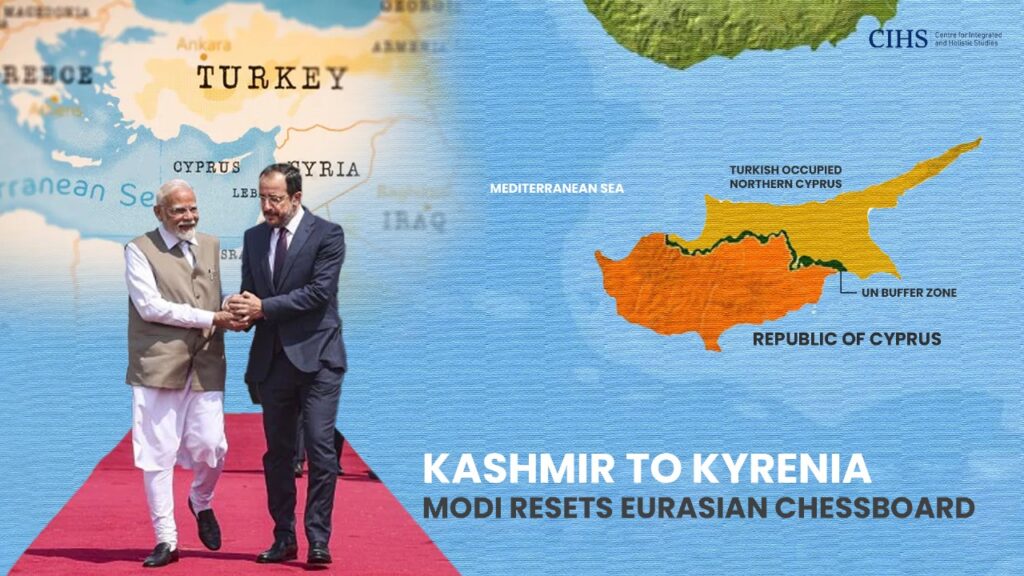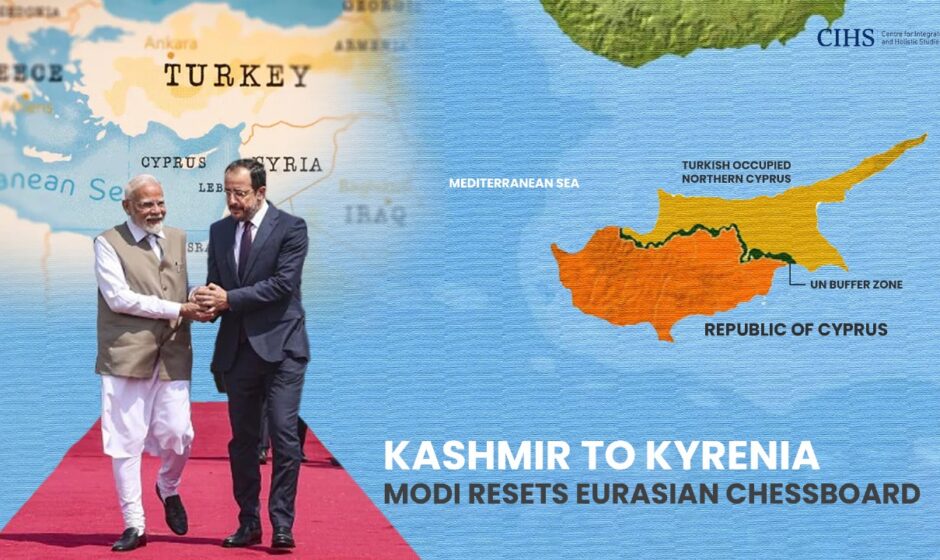Modi’s choice of gift, a hand-knotted Kashmiri silk carpet, was a polite but firm reminder that Jammu and Kashmir is unquestionably India’s sovereign terrain, just as a reunited Cyprus remains Nicosia’s non-negotiable objective.
Rahul Pawa
The world took only passing notice when Prime Minister Narendra Modi touched down in Nicosia on June 15. Yet for close watchers of Eurasian geopolitics, the visit was a strategic inflection point: New Delhi’s most pointed riposte to Ankara’s unabashed support for Islamabad and a deft assertion of India’s own red lines on sovereignty.

Turkey’s dictatorial President Erdogan has, for years, amplified Pakistan’s Jammu and Kashmir narrative at the UN, transferred unlawful killer drone technology to Rawalpindi, and aligned diplomatically after every India-Pakistan flare-up in May 2025.
For New Delhi, Indo-Pacific is no longer the only arena where coercive partnerships need balancing; the Eastern Mediterranean now figures prominently in India’s “extended neighbourhood.” With its 1974 invasion of Cyprus, Turkey occupies roughly 36 percent of the island, a fait accompli recognised only by Ankara. The occupation like the Pakistani Occupation of Jammu and Kashmir and territories of Ladakh namely Gilgit-Baltistan is rarely headline news. But Modi’s landing in Cyprus made sure it briefly elbowed Gaza war, Red Sea shipping routes and Ukraine off analysts’ front pages.
Nominally, the trip produced standard diplomatic deliverables: a joint declaration pledging intensified defence – industrial collaboration, an information-sharing framework on counter-terrorism & cyber security and expanded naval cooperation, Indian warships will make more calls at Cypriot ports and conduct joint search-and-rescue drills.
What made the optics powerful was less the paperwork than symbolism. Modi’s choice of gift, a hand-knotted Kashmiri silk carpet, was a polite but firm reminder that Jammu and Kashmir is unquestionably India’s sovereign terrain, just as a reunited Cyprus remains Nicosia’s non-negotiable objective. The Cypriot leadership reciprocated by publicly thanking India for “standing up for sovereignty,” words that landed like a shot across the bow in Ankara, where strategic planners have banked on the Islamic world’s silence over Northern Cyprus.
Modi offered no press-conference grandstanding; the statement of support appeared in the joint communiquéé and in Cyprus gratitude, proof that deliberate ambiguity often resonates louder than televised barbs.
For decades Eastern Mediterranean has been Turkey’s strategic back-yard. The Turkish Navy exerts sea control; Turkish petroleum parastatals map offshore gas blocks; and Ankara leverages the “Cyprus question” to box out European Union pressure. India’s arrival alters that mental map. Regular Indian Navy port calls, if operationalised, will put a blue-water Asian presence at the doorstep of NATO’s southern flank. That has twin signaling value: to Turkey, that its actions in South Asia carry costs in its own neighbourhood and to the EU-27, that India is willing to shoulder limited security responsibilities in Europe’s periphery.
The visit also dovetails neatly with the nascent India-Middle East-Europe Corridor (IMEC). Cyprus, an EU member and chair in 2026 with convenient trans-shipment facilities and legal clarity, can serve as the Mediterranean gateway for IMEC sea–land–rail lattice, reducing dependence on Suez chokepoint and giving Indian exporters a predictable entry point into the European single market. By grafting strategic access onto an economic corridor, New Delhi builds dual-use leverage without flaunting gunboat diplomacy.
Domestically, Modi’s subtle poke at Ankara offers an answer to critics who argue that New Delhi is often too restrained when foreign capitals weaponise the Jammu and Kashmir discourse. Internationally, the gambit helps India consolidate support among small and medium European states that resent Turkish maximalism but lack the heft to counter it alone.
For Nicosia, partnering with G-20 heavyweight boosts deterrence far beyond what Brussels has provided. There is a United Nations angle, too. Turkey’s military presence in Northern Cyprus violates multiple Security Council resolutions, but enforcement has languished. By throwing India’s diplomatic weight behind Cyprus’s territorial integrity, Modi has effectively globalised what Ankara hoped would remain a regional wrinkle. Elevated visibility complicates any future attempt by Turkey to extract concessions, whether on gas exploration blocs or on a two-state settlement, by holding European unity hostage.
Great-power statecraft often hinges on narrative as much as kinetics. In Cyprus, Modi wrote a concise but compelling script: sovereignty is indivisible, occupations are unacceptable, and India has the agency to intervene, politically and symbolically, well beyond the Indian Ocean. In doing so, New Delhi inserted itself into a theatre where it had little historical presence, turned Turkey’s Cyprus problem into a talking point in South Asia, and reminded Pakistan that its external backers have vulnerabilities of their own. Analysts inclined to dismiss the visit as a minor European detour miss the slow-burn strategic dividend. Like Cheniere’s gas cargoes that transformed LNG markets after years of obscurity, today’s silk-carpet diplomacy may look mundane until the first Indian Navy destroyer docks in Limassol or the first IMEC freight train off-loads Indian pharmaceuticals bound for Central Europe. By then, the message to Ankara will require no amplification: alignments have consequences, and India now writes a few of the footnotes in the Eastern Mediterranean ledger.
For a world fatigued by protracted altercations, Cyprus often feels like a frozen footnote to history. Modi’s masterstroke reminds us that frozen conflicts can thaw and when they do, new actors will shape the meltwater. The sooner chancelleries from Washington to Brussels internalise that reality, the better prepared they will be for the next iteration of Mediterranean geopolitics.
(Rahul Pawa is director, research at New Delhi based think tank Centre for Integrated and Holistic Studies)



